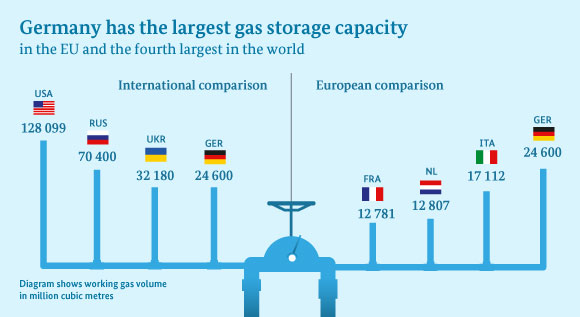Stay warm during the winter – thanks to a secure supply of natural gas
The German gas market is shipshape for the cold season. The Federal Ministry for Economic Affairs and Energy wants to make sure it stays that way and is therefore introducing new measures.
 © Federal Ministry for Economic Affairs and Energy; data from Annual report entitled ‘Erdöl und Erdgas in der Bundesrepublik Deutschland’ (Oil and Gas in the Federal Republic of Germany)
© Federal Ministry for Economic Affairs and Energy; data from Annual report entitled ‘Erdöl und Erdgas in der Bundesrepublik Deutschland’ (Oil and Gas in the Federal Republic of Germany)
Perhaps the following piece of news will make you feel less cold, despite the snowfall we've had in recent days: Germany has the world's fourth-largest gas-storage capacity, which, at close to 24.6 billion cubic metres, is also the largest within the entire European Union. At present, more than 16 billion cubic metres of this is full, which is a good level for the middle of the winter.
Just how long these reserves would last in an emergency would depend on various factors, including the temperature and other weather-related parameters. Other elements that ensure that we can rely on a secure supply of gas include our country's extensive modern gas network, the fact that there is a number of different countries supplying the gas, and well-functioning gas markets.
Greater scope for planning, greater flexibility when buying
In future, the Market Area Managers (MAMs) – i.e. the people in charge of managing gas reserves at regional level – will enjoy greater scope as they plan their resources and be able to make gas available at shorter notice. This is to ensure that all regions in Germany can rely on a secure supply of gas, particularly in the winter. In addition to this, the ministry has tabled a proposal for new rules that would allow greater flexibility for industrial customers to reduce their consumption of gas in a situation of extreme scarcity and to sell this gas in exchange for a fee. This would be on a voluntary basis. Both proposals are set out in a new draft paper (German only) published by the Federal Ministry for Economic Affairs and Energy. They are designed to benefit everyone: industry, which would generate additional income, and consumers in Germany, who would enjoy greater energy security thanks to this greater demand-side flexibility.
In 2014, 38 per cent of the natural gas imported by Germany came from Russia, 26 per cent from the Netherlands, and 20 per cent from Norway. A study commissioned by the Federal Ministry for Economic Affairs and Energy and published in summer 2015 had already shown that Germany has sufficient gas-storage capacity to be able to guarantee a secure supply of gas, even during cold spells or in the event of a disruption to the supply.

